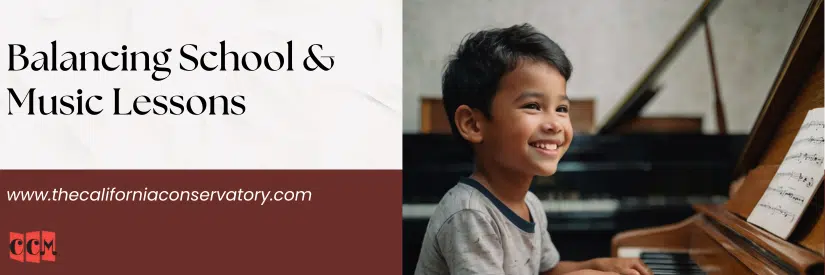November 4, 2024
Extracurricular Activities: Balancing School and Music Lessons

In today’s fast-paced educational environment, balancing school with extracurricular activities can be a challenge for many students and their families. Music lessons, a popular choice among extracurricular activities, offer profound benefits while requiring time and dedication. This blog explores effective strategies to balance school responsibilities with music lessons, ensuring students can thrive in both arenas!
Benefits of Music Lessons as an Extracurricular Activity
Music lessons are more than just an artistic outlet; they provide a range of benefits that support academic and personal growth. Engaging in music improves cognitive abilities, enhances time management skills, and fosters emotional expression. These skills are invaluable, not only academically but in overall personal development. By recognizing the dual benefits of music as an extracurricular activity, families can appreciate the importance of maintaining this balance.
Setting Realistic Goals
Balancing school and music lessons starts with setting realistic goals. Students should outline clear, achievable objectives for both their academic and musical pursuits. This might involve scoring well on tests or reaching the next book level in music lessons. By setting goals, students can monitor their progress and adjust their efforts in school and music lessons accordingly.
Effective prioritization is key in managing school and extracurricular activities. Students should identify which tasks require immediate attention and which can wait. For instance, during recital season, you may try to fit more music practice into your schedule so that you feel prepared to perform. Learning to prioritize helps students reduce stress and focus on tasks that require the most attention.
Creating a Structured Schedule
A well-planned schedule is crucial to balance school and music lessons effectively. Students should allocate specific times for homework, study, music practice, and relaxation. This structure prevents overcommitment and ensures that students have ample time for both academic and musical growth. Utilizing planners or digital calendars can help keep track of assignments and upcoming music recitals, making it easier to manage time effectively. Consider a reward system as well to keep students excited to practice and learn more in school!
Utilizing Activity Resources & Communication
Open communication with school teachers and music instructors can facilitate better balance. Informing them about each other’s schedules and significant deadlines can help them understand the student’s commitments. Teachers and instructors often can provide guidance on managing workload and might even coordinate to support the student’s needs. Many schools offer resources that can help students balance their coursework with extracurricular activities. Tutoring, study groups, and academic counseling are valuable resources that can help manage schoolwork more efficiently. At the California Conservatory of Music, we have a great practice incentive program! Our program includes practice streaks: kids can get medals, and certificates for consistently practicing, homework sheets and practice points, and the Practice Space App! Taking advantage of these resources can free up more time for music practice and reduce academic pressure. Ask about CCM’s practice incentives!
Learning Efficient Practice Techniques
For students balancing school and music lessons, effective time management is crucial. The Pomodoro Technique is especially useful; dedicate 25-minute blocks to tackling specific challenges, such as a difficult music passage or a complex math problem, followed by a 5-minute break to reset. Utilize technology to streamline practice—apps like metronomes for musicians and flashcard tools for academics can enhance productivity. Aim for short, frequent review sessions rather than lengthy, infrequent ones, as this helps reinforce material more effectively. Above all, consistency is key; regular, focused practice sessions contribute to significant improvements in both academic and musical pursuits, making the balancing act more manageable and less stressful.
Final Thoughts
Balancing school with music lessons, like any extracurricular activities, demands careful planning, communication, and prioritization. By adopting structured schedules, setting realistic goals, and using efficient study techniques, students can excel in their academic and musical endeavors. Ultimately, the goal is to enjoy and benefit from both educational experiences without compromising on either.
Sign up for a FREE introductory music lesson at The California Conservatory of Music!

